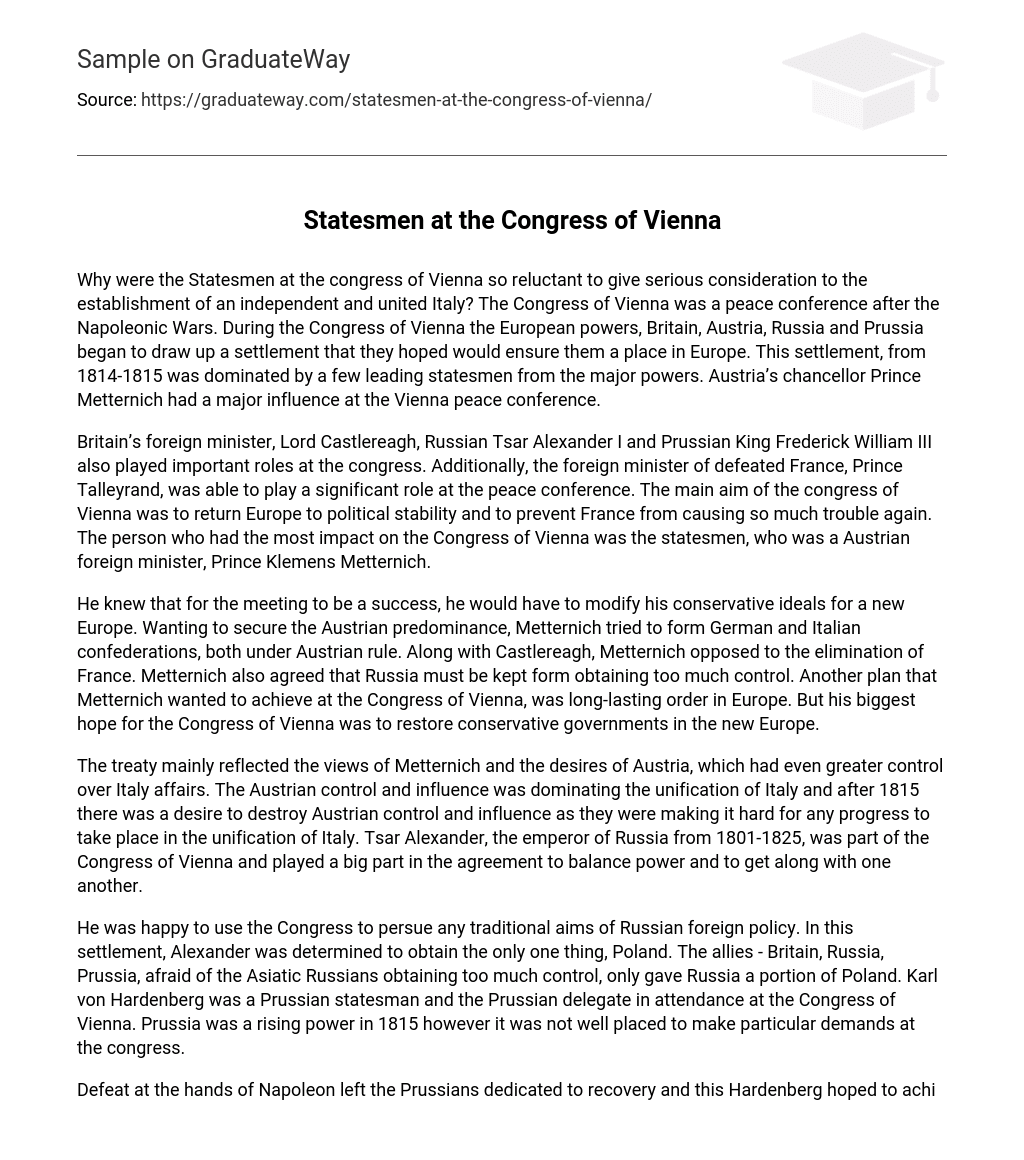Why were the Statesmen at the congress of Vienna so reluctant to give serious consideration to the establishment of an independent and united Italy? The Congress of Vienna was a peace conference after the Napoleonic Wars. During the Congress of Vienna the European powers, Britain, Austria, Russia and Prussia began to draw up a settlement that they hoped would ensure them a place in Europe. This settlement, from 1814-1815 was dominated by a few leading statesmen from the major powers. Austria’s chancellor Prince Metternich had a major influence at the Vienna peace conference.
Britain’s foreign minister, Lord Castlereagh, Russian Tsar Alexander I and Prussian King Frederick William III also played important roles at the congress. Additionally, the foreign minister of defeated France, Prince Talleyrand, was able to play a significant role at the peace conference. The main aim of the congress of Vienna was to return Europe to political stability and to prevent France from causing so much trouble again. The person who had the most impact on the Congress of Vienna was the statesmen, who was a Austrian foreign minister, Prince Klemens Metternich.
He knew that for the meeting to be a success, he would have to modify his conservative ideals for a new Europe. Wanting to secure the Austrian predominance, Metternich tried to form German and Italian confederations, both under Austrian rule. Along with Castlereagh, Metternich opposed to the elimination of France. Metternich also agreed that Russia must be kept form obtaining too much control. Another plan that Metternich wanted to achieve at the Congress of Vienna, was long-lasting order in Europe. But his biggest hope for the Congress of Vienna was to restore conservative governments in the new Europe.
The treaty mainly reflected the views of Metternich and the desires of Austria, which had even greater control over Italy affairs. The Austrian control and influence was dominating the unification of Italy and after 1815 there was a desire to destroy Austrian control and influence as they were making it hard for any progress to take place in the unification of Italy. Tsar Alexander, the emperor of Russia from 1801-1825, was part of the Congress of Vienna and played a big part in the agreement to balance power and to get along with one another.
He was happy to use the Congress to persue any traditional aims of Russian foreign policy. In this settlement, Alexander was determined to obtain the only one thing, Poland. The allies – Britain, Russia, Prussia, afraid of the Asiatic Russians obtaining too much control, only gave Russia a portion of Poland. Karl von Hardenberg was a Prussian statesman and the Prussian delegate in attendance at the Congress of Vienna. Prussia was a rising power in 1815 however it was not well placed to make particular demands at the congress.
Defeat at the hands of Napoleon left the Prussians dedicated to recovery and this Hardenberg hoped to achieve by augmenting Prussian territory in Germany. Although, he found his options restricted as King Fredrick William regarded the Tsar as his ‘divine friend’ and was excessively grateful to Alexander for liberating his country from Napoleon’s grip. Viscount Castlereagh was the British foreign secretary from 1812 to 1822. Castlereagh was a major player in the Congress of Vienna. He was involved with the redrawing of the post-Napoleonic map and was a major influence in the Concert of Europe.
As a leader in bringing together the powers they overthrew Napoleon and in forming the Congress of Vienna, Castlereagh was a large influence in promoting diplomacy by conference. The viscount’s main objective at the Congress of Vienna was to keep Russia from gaining too much control and to strengthen a weak Germany and Italy. Castlereagh also took the lead in denying Russia’s territorial demands on Poland. Lastly, another statesmen who had an impact on not wanting to unite Italy was Charles Talleyrand, a French statesman and a diplomat. He was the diplomat from France and was assigned to the Congress of Vienna.
With the interest of France, Talleyrand managed to divide the allies and to keep France in one piece. He did this by forming an alliance with Britain and Austria. As this new alliance, the three powers were able to prevent the splitting of French land. During the Congress of Vienna from 1814 to 1815, European powers determined the borders and rulers of post-Napoleonic Europe. The congress was dominated by the reactionary views of Austria’s chancellor Metternich, who rejected the forces of liberalism and nationalism that had been awakened by the French Revolution.
Additionally, The Vienna settlement failed to wipe out all traces of Napoleonic rule in Italy however, the Austrian influence over Italy was considerable and Metternich’s insistence that all traces of liberal government be suppressed was generally followed. The statesmen knew that if there was a unification for Italy would affect their countries in some way and they were representing their country and didn’t want to let that happen. The congress of Vienna showed how diverse Italy was and that unifying Italy would be a long process.





